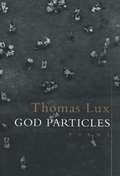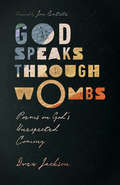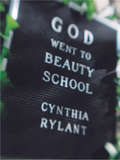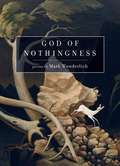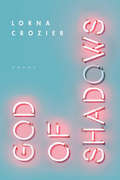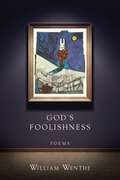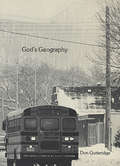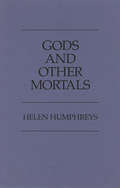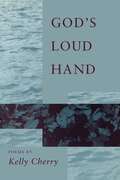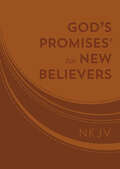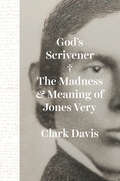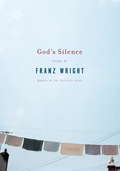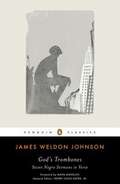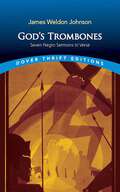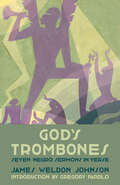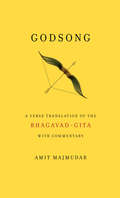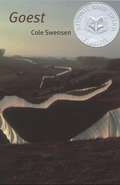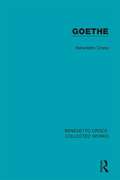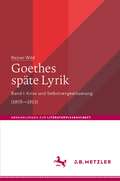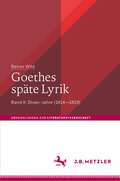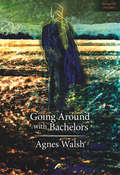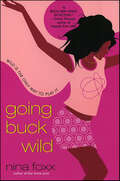- Table View
- List View
God Particles: Poems
by Thomas LuxGod Particles displays the distinctive originality and unpredictability that prompted the Washington Post Book World to name Lux one of this generation’s most gifted poets. A satiric edge, tempered by profound compassion, cuts through many of the poems in Lux’s book. While themes of intolerance, inhumanity, loss, and a deep sense of mortality mark these poems, a lighthearted grace instills even the somberest moments with unexpected sweetness. In the title poem Lux writes, “there’s no reason for God to feel guilt / I think He was downhearted, weary, too weary / to be angry anymore . . . / He wanted each of us, / and all the things we touch . . . / to have a tiny piece of Him / though we are unqualified, / of even the crumb of a crumb.” Dark, humorous, and strikingly imaginative, this is Lux’s most compassionate work to date.
God Speaks Through Wombs: Poems on God's Unexpected Coming
by Drew JacksonBut God speaks through wombs, birthing prophetic utterances. . . . Enough of this unbelieving religion that masquerades as faith. Divine favor is placed on what we have disgraced. In God Speaks Through Wombs, Drew Jackson explores the first eight chapters of Luke's Gospel in a new poetic register. These are declarative poems, faithfully proclaiming the gospel story in all its liberative power. Here the gospel is the "fresh words / that speak of / things impossible." From the Magnificat ("That girl can sing! . . . She has a voice / That can shatter shackles") to the baptism of Christ ("I stepped in / Committing insurrection"), this collection helps us hear the hum of deliverance���against all hope���that's been in the gospel all along.
God Went to Beauty School
by Cynthia RylantA deeply compelling collection of poems about God and our everyday world from a Newbery medalist. Cynthia Rylant takes teens on an invigorating spiritual journey as she explores what God's life on Earth might be like. Rylant's reflective and often humorous verse follows God as he tries out human activities such as getting a dog, writing a fan letter, and making spaghetti. God Went to Beauty School combines the awesome with the everyday in an accessible, thought-provoking, and intelligent manner.
God and a Mouse
by M. AngelaSister Mary Angela describes her mouse as a contemplative and devout mouse, a lover of beauty and a philosopher. Her words are English poetry with the musical emphasis of Spanish-speaking communities.
God and a Mouse
by Mary Angela ToigoA tiny meditative book of poetry from a Benedictine nun, written from the perspective of a contemplative and devout mouse--a lover of beauty and a philosopher. His words are English poetry with the musical emphasis of Spanish-speaking communities. The poetry alternates with original artwork from a respected Hispanic artist. All the illustrations are described.
God of Nothingness: Poems
by Mark WunderlichA magnificent book of hope and resolve written out of profound losses, by award-winning poet Mark Wunderlich
God of Shadows
by Lorna CrozierThe celebrated poet hailed by Ursula K. Le Guin as a "storyteller, truth-teller, and visionary" gives us a mesmerizing new collection of poems that are funny, wise, moving, and surprising.How many gods can dance on the head of Lorna Crozier's pen? The poet Lorna Crozier has always been brilliant at fusing the ordinary with the other-worldly in strange and surprising ways. Now the Governor General's Literary Award-winning author of Inventing the Hawk returns with God of Shadows, a wryly wise book that offers a polytheistic gallery of the gods we never knew existed and didn't know we needed. To read these poems is to be ready to offer your own prayers to the god of shadows, the god of quirks, and the god of vacant houses. Sing new votive hymns to the gods of horses, birds, cats, rats, and insects. And give thanks at the altars of the gods of doubt, guilt, and forgetting. What life-affirming questions have these deities come to ask? Perhaps it is simply this: How can poems be at once so profound, original and lively, and also so much fun?
God's Foolishness: Poems
by William WentheSt. Paul writes "the foolishness of God is wiser than men. " The poems in William Wenthe's God's Foolishness mine the feelings of human uncertainty in matters of love and desire, time and death, and uncover difficult truths with transformative insights. These are poems of crisis. Wenthe examines our conflicting urges to see nature as sustenance and to foolishly destroy it. His poems shift from close observation to panorama with cinematic fluidity, from a tea mug to an ancient monument, from a warbler on an elm branch to the specter of imminent natural disaster. Offering passion and intellect balanced with a careful concern for poetic craft, Wenthe's God's Foolishness gives us fine poems to savor and admire.
God's Geography
by Don GutteridgeDon Gutteridge approaches his home town of Point Edward, Ontario, with an array of listening and recording devices, mixing poetry, documentary newspaper collage, interviews and photography. A milestone in the documentary poem.
God's Geography
by Helen HumphreysPrecisely etched meditations on public and private experience, charged landscapes and reconceived Greek myths.
God's Loud Hand: Poems (Southern Literary Studies)
by Kerry CherryIf religious poetry may be thought of as a great river fed, in the English language, by two main streams—the devotional tradition, leading in recent times to Anne Sexton and John Berryman, and the contrastingly philosophical tradition, exemplified by William Blake—it is to the latter that this new book by Kelly Cherry belongs. In the poems of God’s Loud Hand, Cherry conducts—often not at all devotionally, often with an honesty that precludes the emphasis on self that tends to be present in devotional poetry (“Lord save me,” “Lord forgive me,” “Lord help me”)—a metaphorical investigation of the theological ideas. These are fiercely intellectual poems, which, in the way of T.S. Eliot, are more akin in their stringent analysis to Tillich or Niebuhr, perhaps, than to someone like Simone Weil. At their base in a willingness to ask Abraham’s great question, “Shall not the Judge of all the earth judge wisely?” This intellectual boldness reveals itself in a formal argumentation rare in contemporary poetry. Like Donne or Hopkins, Kelly Cherry defines her terms, orders her points logically—no vagary or sentimentality appears here. The result of such exactitude is a kind of clarity, a grace, that seems to lift the poems off the page, to cause them to rise, make their own kind of ascension. It is as if these poems were larks—an exaltation of larks, as they say—that rise each morning to heaven’s gate, but instead of singing hymns, they sing philosophy’s own music. And in what a remarkable variety of keys, what a range of modes and moods. From the opening poems of historical and mythological drama, through the passionate love songs of the second sections, through the dark night of the soul that takes place in the third, to the orchestral outburst of the final group of poems—poetry celebrating its own freedom ot be poetry—in all these parts (“a chorus of lyrics,” one might say) there is a symphonic unity that astonishes, an ode to joy.
God's Promises for New Believers
by Jack CountrymanA new book for new believersùdestined to become a classic!A new life in Christ is something to be celebrated. Brand-new believers are overflowing with excitement and anticipation about their new journey of faith. They deserve a meaningful guidebook that will help them know where to turn for the wonderful things God has promised for them throughout scripture. Divided topically and filled with Scripture promises and teachings for new Christians, this book is a wonderful gift for anyone who has recently become a new believer.For more than thirty years, the GodÆs Promises« seriesùwhich has sold more than 15 million copiesùhas been guiding and comforting people through topically arranged scriptures addressing many facets of life.This promise book features short, topically based chapters teaching readers about the basics of their newfound faith. Interwoven within each chapter are scripture verses that address questions and topics that specifically answer the needs of new believers. This book will bring biblical answers to many questions new believers face, offering encouragement, hope, and a taste of the abundant promises of God for those who believe in Him.Sample topics include:New believers in the faithWhat is salvation?What to do when you need wisdomHow to overcome temptation Trim Size: 4.5 x 7.125
God's Scrivener: The Madness & Meaning of Jones Very
by Clark DavisA biography of a long-forgotten but vital American Transcendentalist poet. In September of 1838, a few months after Ralph Waldo Emerson delivered his controversial Divinity School address, a twenty-five-year-old tutor and divinity student at Harvard named Jones Very stood before his beginning Greek class and proclaimed himself “the second coming.” Over the next twenty months, despite a brief confinement in a mental hospital, he would write more than three hundred sonnets, many of them in the voice of a prophet such as John the Baptist or even of Christ himself—all, he was quick to claim, dictated to him by the Holy Spirit. Befriended by the major figures of the Transcendentalist movement, Very strove to convert, among others, Elizabeth and Sophia Peabody, Bronson Alcott, Nathaniel Hawthorne, and most significantly, Emerson himself. Though shocking to some, his message was simple: by renouncing the individual will, anyone can become a “son of God” and thereby usher in a millennialist heaven on earth. Clark Davis’s masterful biography shows how Very came to embody both the full radicalism of Emersonian ideals and the trap of isolation and emptiness that lay in wait for those who sought complete transcendence. God’s Scrivener tells the story of Very’s life, work, and influence in depth, recovering the startling story of a forgotten American prophet, a “brave saint” whose life and work are central to the development of poetry and spirituality in America.
God's Scrivener: The Madness and Meaning of Jones Very
by Clark DavisA biography of a long-forgotten but vital American Transcendentalist poet. In September of 1838, a few months after Ralph Waldo Emerson delivered his controversial Divinity School address, a twenty-five-year-old tutor and divinity student at Harvard named Jones Very stood before his beginning Greek class and proclaimed himself “the second coming.” Over the next twenty months, despite a brief confinement in a mental hospital, he would write more than three hundred sonnets, many of them in the voice of a prophet such as John the Baptist or even of Christ himself—all, he was quick to claim, dictated to him by the Holy Spirit. Befriended by the major figures of the Transcendentalist movement, Very strove to convert, among others, Elizabeth and Sophia Peabody, Bronson Alcott, Nathaniel Hawthorne, and most significantly, Emerson himself. Though shocking to some, his message was simple: by renouncing the individual will, anyone can become a “son of God” and thereby usher in a millennialist heaven on earth. Clark Davis’s masterful biography shows how Very came to embody both the full radicalism of Emersonian ideals and the trap of isolation and emptiness that lay in wait for those who sought complete transcendence. God’s Scrivener tells the story of Very’s life, work, and influence in depth, recovering the startling story of a forgotten American prophet, a “brave saint” whose life and work are central to the development of poetry and spirituality in America.
God's Silence
by Franz WrightIn this luminous new collection of poems, Franz Wright expands on the spiritual joy he found in his Pulitzer Prize-winningWalking to Martha’s Vineyard. Wright, whom we know as a poet of exquisite miniatures, opensGod’s Silencewith “East Boston, 1996,” a powerful long poem that looks back at the darker moments in the formation of his sensibility. He shares his private rules for bus riding (“No eye contact: the eyes of the terrified / terrify”), and recalls, among other experiences, his first encounter with a shotgun, as an eight-year-old boy (“In a clearing in the cornstalks . . . it was suggested / that I fire / on that muttering family of crows”). Throughout this volume, Wright continues his penetrating study of his own and our collective soul. He reaches a new level of acceptance as he intones the paradox “I have heard God’s silence like the sun,” and marvels at our presumptions: We speak of Heaven who have not yet accomplished even this, the holiness of things precisely as they are, and never will! Though Wright often seeks forgiveness in these poems, his black wit and self-deprecation are reliably present, and he delights in reminding us that “literature will lose, sunlight will win, don’t worry. ” But in this book, literature wins as well. God’s Silenceis a deeply felt celebration of what poetry (and its silences) can do for us. From the Hardcover edition.
God's Trombones
by Maya Angelou Henry Louis Gates James Weldon JohnsonJames Weldon Johnson was a leading figure of the Harlem Renaissance, and one of the most revered African Americans of all time, whose life demonstrated the full spectrum of struggle and success. In God’s Trombones, one of his most celebrated works, inspirational sermons of African American preachers are reimagined as poetry, reverberating with the musicality and splendid eloquence of the spirituals. This classic collection includes “Listen Lord—A Prayer,” “The Creation,” “The Prodigal Son,” “Go Down Death—A Funeral Sermon,” “Noah Built the Ark,” “The Crucifixion,” “Let My People Go,” and “The Judgment Day.”
God's Trombones: Seven Negro Sermons in Verse (Dover Thrift Editions: Black History)
by James Weldon JohnsonJames Weldon Johnson (1871–1938) was a revered African American civil rights leader, diplomat, lawyer, novelist, poet, and songwriter in the Harlem Renaissance. He also coauthored the hymn “Lift Every Voice and Sing,” known as the Black national anthem. God’s Trombones, one of Johnson’s most celebrated works, transforms seven uplifting spiritual sermons of African American preachers into poetry. God’s Trombones equates the Black oral tradition and its characteristic cadence with the sweeping tonal ranges of the trombone, which most closely resembles the human voice. This classic collection includes “Listen, Lord — A Prayer”; “The Creation”; “The Prodigal Son”; “Go Down Death — A Funeral Sermon”; “Noah Built the Ark”; “The Crucifixion”; “Let My People Go”; and “The Judgment Day.”
God's Trombones: Seven Negro Sermons in Verse (Vintage Classics)
by James Weldon JohnsonA Harlem Renaissance classic: seven inspirational poems inspired by the powerful rhetorical traditions of African-American sermons and spirituals.James Weldon Johnson, the co-author of "Lift Every Voice and Sing" and author of The Autobiography of an Ex-Colored Man, was a leading figure of the Harlem Renaissance. In God's Trombones, one of his most celebrated works, the rich tradition of inspirational sermons by Black preachers are reimagined as poetry, reverberating with the musicality and splendid eloquence of the classic spirituals. This collection includes "The Creation," "The Prodigal Son," "Go Down Death (A Funeral Sermon)," "Noah Built the Ark," "The Crucifixion," "Let My People Go," and "The Judgment Day," and includes the remarkable original illustrations by artist Aaron Douglas.
Godsong: A Verse Translation of the Bhagavad-Gita, with Commentary
by Amit MajmudarA fresh, strikingly immediate and elegant verse translation of the classic, with an introduction and helpful guides to each section, by the rising American poet.Born in the United States into a secularized Hindu family, Amit Majmudar puzzled over the many religious traditions on offer, and found that the Bhagavad Gita had much to teach him with its "song of multiplicities." Chief among them is that "its own assertions aren't as important as the relationships between its characters . . . The Gita imagined a relationship in which the soul and God are equals"; it is, he believes, "the greatest poem of friendship . . . in any language." His verse translation captures the many tones and strategies Krishna uses with Arjuna--strict and berating, detached and philosophical, tender and personable. "Listening guides" to each section follow the main text, and expand in accessible terms on the text and what is happening between the lines. Godsong is an instant classic in the field, from a poet of skill, fine intellect, and--perhaps most important--devotion.
Goest
by Cole SwensenTreating subjects from landscape to sculpture to a 19th century technical encyclopedia, the poet is fascinated with light, glass, mirrors, flame, ice, mercury--things transparent, evanescent, impossible to grasp. Likewise Swensen's lyrics, which, with elliptical phrasing and play between visual and aural, change the act of seeing--and reading--offering glimpses of the spirit (or ghost) that enters a poem where the rational process breaks down.From "The Invention of Streetlights"Certain cells, it's said, can generate light on their own.There are organisms that could fit on the head of a pin.and light entire rooms. .Throughout the Middle Ages, you could hire a man.on any corner with a torch to light you home. were lamps made of horn.and from above a loom of moving flares, we watched.Notre Dame seem small. .Now the streets stand still. .By 1890, it took a pound of powdered magnesium.to photograph a midnight ball."Goest, sonorous with a hovering 'ghost' which shimmers at the root of all things, is a stunning meditation--even initiation--on the act of seeing, proprioception, and the alchemical properties of light as it exists naturally and inside the human realm of history, lore, invention and the 'whites' of painting. Light becomes the true mistress and possibly the underlying language of all invention. Swensen's poetry documents a penetrating 'intellectus'--light of the mind--by turns fragile, incandescent, transcendent."--Anne Waldman
Goethe: Con Una Scelta Delle Liriche Nuovamente Tradotte (classic Reprint) (Collected Works)
by Benedetto CroceCroce admired Goethe partly because the latter possessed a knowledge of human nature in all its aspects but nonetheless kept his mind above and beyond political sympathies and the quarrels of nations. In this volume originally published in English in 1923, Croce distils his critical ideas about Goethe with the aim of helping readers to better understand the German poet’s work.
Goethes späte Lyrik: Band I: Krise und Selbstvergewisserung (1805–1813) (Abhandlungen zur Literaturwissenschaft)
by Reiner WildBand I von Reiner Wilds Gesamtdarstellung der Alterslyrik Goethes behandelt die Zeitspanne zwischen dem Todesjahr Schillers 1805 und 1813/14, dem Ende der napoleonischen Ära. Der Autor zeigt, dass sich Goethes Dichtungsverständnis nach 1805 grundlegend ändert, von der Lyrik des subjektiven Ausdrucks hin zum Gedicht als Medium der Kommunikation. Die Mehrzahl der ca. 150 Gedichte dieser Zeit sind Gelegenheitsgedichte, vor allem Gedichte an Personen, und Lieder zu geselligen Anlässen. Hinzu kommt eine Reihe von Balladen, in denen sich Goethe mit den Zeittendenzen auseinandersetzt. Zu den Neuerungen dieser Jahre gehört Goethes Interesse an Spruchdichtung, deren Produktion vor allem nach 1810 stetig zunimmt. Mit der Analyse der Gedichte und ihrer Entstehungs- und Verwendungszusammenhänge entsteht ein neues, differenzierteres Bild von Goethes lyrischem Alterswerk.
Goethes späte Lyrik: Band II: Divan-Jahre (1814–1819) (Abhandlungen zur Literaturwissenschaft)
by Reiner WildBand II von Reiner Wilds Gesamtdarstellung der Alterslyrik Goethes gilt den Jahren 1814 bis 1819. Lyrisches Hauptgeschäft ist der West-östliche Divan (1819). Goethes bedeutendste Gedichtsammlung ist ein Werk der interkulturellen Begegnung mit dem Orient und zugleich einer der großen Liebeslyrikzyklen der europäischen Dichtung. Darüber hinaus werden Religion, Politik, Geschichte und nicht zuletzt die Dichtung selbst verhandelt. Neben den Divan treten Geselligkeitslyrik und Sprüche sowie vor allem Lehrdichtung zu naturwissenschaftlichen und philosophischen Themen. Auffällig ist die Gruppierung in Ensembles und die Inszenierung von Kommunikation mit den Lesern. Teile dieses späten Schaffens, das Goethe oftmals zuerst in seinen Zeitschriften veröffentlicht, gehören nicht in den klassischen Kanon und wurden bisher nur marginal behandelt. Band II erschließt diese Werke nun umfassend als Gegenstand literaturwissenschaftlicher Analysen
Going Around with Bachelors
by Agnes WalshShortlisted for the 2008 Pat Lowther Award and the 2009 Heritage and History Book Award [Writers Alliance of Newfoundland and Labrador], nominated for LGBT Poetry (2008 Lambda Literary Awards) and longlisted for the 2008 ReLit Awards The spirit of the departed -- source, origin, heritage, history -- is the essence of this book, rich with the tang of Newfoundland speech. Agnes Walsh's first book, In the Old Country of My Heart, is one of the most read and best loved books of poetry to come out of Newfoundland. Going Around with Bachelors continues and extends Walsh’s distinctive subject matter: the past in the present, Ireland and Portugal in Newfoundland, weather internal and external, the Cape Shore. Here are poems of place and of people in place, of family both immediate and extended. They are also absolutely contemporary poems by a poet, gifted with a remarkably flexible and distinctive voice, who is planted, in her own words, "straight up and down into what’s new."
Going Buck Wild
by Nina FoxxLet's go crazy!Successful Claudia Barrett seems to be doing it all right. She's a vice president at her firm, with an engagement ring on her finger from the man who's loved her since high school. So what if she's been wearing it for five years -- and her classic, expensive, dull everyday outfits make her look like someone fatally allergic to a good time?What exactly is wrong with the girl?She's bored, for one thing. She's thirty years old and in a rut -- and best friend, Pam, thinks it's time Claudia got her freak on. It's time to inject a little action, adventure, and good old-fashioned lust into this sister's life. But practicing what Pam is preaching and going buck wild could have some serious consequences, especially when tall, dark, and dangerous Cody is added to the mix.
